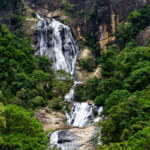Finding Solutions to Sri Lanka’s Macaque Monkey Challenge – By Bhanuka – eLanka

Sri Lanka is home to a rich variety of wildlife, including the toque macaque (Macaca sinica), a monkey species found only on the island. However, as urban areas expand and forests shrink, human-macaque conflicts have increased. These intelligent primates often enter villages, farms, and even cities in search of food, leading to property damage and tensions with communities.
Instead of focusing on drastic measures, humane and sustainable solutions can help manage the macaque population while ensuring their well-being and coexistence with humans.
Understanding the Root Causes
To find solutions, it is important to first understand why macaques are increasingly interacting with humans. The main reasons include:
- Loss of Natural Habitat – Deforestation and land development have reduced the forests where macaques naturally live.
- Food Availability – Improper waste disposal, temple offerings, and agricultural crops provide easy food sources, attracting monkeys.
- Changes in Human Behavior – Feeding monkeys, intentionally or unintentionally, encourages them to seek food in human settlements.
- Shifts in Agricultural Practices – Large-scale monoculture farming has made certain areas highly attractive to macaque troops.
Humane and Effective Solutions
1. Managing Food Waste Properly
One of the most effective ways to reduce human-macaque conflicts is to control food waste. Since monkeys are drawn to easily accessible food, it is crucial to:
- Secure garbage bins with monkey-proof lids in urban and rural areas.
- Educate temple authorities on proper disposal of food offerings to prevent attracting macaques.
- Encourage responsible tourism, discouraging people from feeding monkeys near religious sites and public spaces.
2. Creating Designated Feeding Zones
Instead of allowing macaques to scavenge in urban areas, authorities could establish designated feeding zones near forests. These areas would:
- Offer controlled feeding to keep macaques away from human settlements.
- Reduce competition for food within monkey troops, minimizing aggressive behavior.
- Encourage natural foraging habits while providing supplementary food when necessary.
3. Implementing Sterilization Programs
A long-term, humane solution to population control is pharmaceutical sterilization. While surgical sterilization programs have faced logistical challenges, new non-invasive contraceptive methods can:
- Gradually reduce the monkey population without harming existing animals.
- Ensure a sustainable and ethical approach to managing their numbers.
- Align with successful sterilization programs used in other countries like India.
4. Protecting Agricultural Lands Without Harm
Farmers often struggle with macaques raiding crops. Instead of using harmful deterrents, they can implement non-lethal protection methods, such as:
- Planting crops that monkeys dislike, such as chili, ginger, or citrus.
- Using motion-activated sprinklers or harmless noise devices to scare macaques away.
- Setting up buffer zones with natural barriers like thorny plants or fencing.
5. Strengthening Conservation Efforts
Protecting and restoring forests ensures that macaques have enough space and food in their natural habitat. Conservation strategies should include:
- Reforestation projects to rebuild lost habitats.
- Strict protection of existing wildlife reserves to prevent further encroachment.
- Community-led conservation programs that involve locals in protecting both forests and wildlife.
6. Public Awareness and Education
Educating people on coexisting with wildlife is crucial to long-term success. Schools, communities, and religious institutions can:
- Raise awareness about the importance of wildlife conservation.
- Teach responsible waste management to prevent attracting monkeys.
- Encourage ethical behavior toward macaques, discouraging unnecessary feeding or teasing.
A Future of Peaceful Coexistence
Sri Lanka’s macaques are a valuable part of the country’s biodiversity. While human-monkey conflicts present challenges, compassionate and science-based solutions can help manage the situation effectively.
By working together—government agencies, conservationists, farmers, and the public—Sri Lanka can find a balanced approach that protects both human livelihoods and wildlife welfare.
Rather than viewing macaques as a problem, let’s see them as part of our natural heritage. With the right strategies, we can ensure a harmonious coexistence for future generations.




















